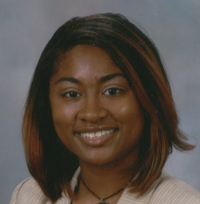 (EDITOR’S NOTE: This is the sixth in a series of stories about a move to ban affirmative action in Nebraska and the potential impact such a policy change would have at UNMC.)
(EDITOR’S NOTE: This is the sixth in a series of stories about a move to ban affirmative action in Nebraska and the potential impact such a policy change would have at UNMC.)
It seems that whenever Jameca Price travels abroad, she gets a new idea about how to help people.
She was in Botswana, Africa, in the summer of 2003 working with pediatric HIV patients when she decided to go into medicine.
Later that summer, it was a tour of the national health system in Cuba that inspired her to pursue clinical medicine.
The Lawton, Okla., native was majoring in biochemistry with a minor in history at the University of Oklahoma, Norman, at the time. Her future was planned — become a scientist and work in a laboratory.
“I thought biochemistry was an opportunity to create things and mess with chemicals,” she said. “I liked to find answers that are very clear, there were no gray areas.”
But, that fateful summer changed her goals and put her on the path towards medicine. Her path took another turn toward public health during her third year of medical school at UNMC when she worked at a clinic in Jamaica and assisted with surgeries in Haiti.
Now Price is completing the fourth of a five year program that will give her the distinction of becoming UNMC’s first M.D./M.P.H. community health education graduate.
She never would have had those life-changing experiences if it had not been for the Minorities in Medicine Enrichment Program, an affirmative action summer course sponsored by Baylor College of Medicine and Rice University in Houston.
“I was a junior in college when I attended this program. I met a lot of minority students who were interested in medicine, and they had a passion for it. I didn’t have that passion yet,” Price said.
“This program was important because it showed us that it’s possible for people of color to be in medicine,” she said.
Luckily, one of the professors asked if she was interested in going to Botswana the next summer to do medical outreach. She always wanted to go to Africa, so she agreed.
 |
Jameca Price |
“I saw how I could be the bridge of understanding between medicine and the community.”
With bachelor’s degree in hand the next year and a new-found passion, she weighed her many offers from medical schools and chose UNMC.
“The interview at UNMC was second to none and the tour of the facilities was fabulous,” Price said. “I loved that there were opportunities to go abroad. The faculty was welcoming and friendly. I thought, if they are investing this much in the interview, they must invest much more in the teaching.”
The oldest of eight girls and one boy born to a single mother, life has been a struggle. Her mother, who left school after the eighth grade, didn’t have the money to pay for higher education for her daughters. But, Price, armed with brains and initiative, secured scholarships and jobs to pay for college.
Her next two youngest sisters also earned college degrees and are now working as a teacher and a psychologist.
“My mother is very proud of what her girls have achieved,” Price said.
“Affirmative action leveled the playing field for me; it didn’t give me a hand out,” she said. “After you get into medical school, you’re doing the same work as everyone else. It gives opportunity to students who didn’t have the best of schooling.”
A petition currently being circulated in Nebraska aims to ban affirmative action policies and programs such as those used by UNMC that open the doorway to opportunities for women and people of color in public contracting, public employment and public education.
To place the measure on the November ballot in Nebraska, supporters must collect verified signatures from 10 percent of the state’s registered voters, or about 115,000 Nebraskans, by July 4.
Price hopes the measure fails here just as it did in Oklahoma, her home state. To help spread the word, she is active on UNMC’s Affirmative Action Speaker’s Bureau.
Price received one of three scholarships from the College of Medicine Class of ’63 that are slated for distinguished minority, male and female students.
Private and state funded scholarships/financial aid programs that use race, ethnicity, nationality and gender as part of the selection process are at risk if this measure passes. If the state adopts an affirmative action ban, these factors could no longer be used to award scholarships.
Price’s passion and vision for her future — provide health and education services at a women’s community center with the goal of reducing infant mortality — may not be within reach without the help of the affirmative action programs.
“Affirmative action programs are critical, especially in medicine. Patients often prefer physicians who look like them, who have the same nationality or ethnicity,” Price said. “Having greater diversity provides better patient care and gives patients the option of selecting a physician of color.”
If you would like a member of UNMC’s Affirmative Action Speaker’s Bureau to give a presentation to a campus group or civic organization, please contact Jo Giles at 559-4696 or jgiles@unmc.edu.